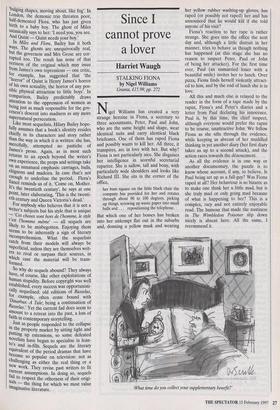Since I cannot prove a lover
Harriet Waugh
STALKING FIONA by Nigel Williams Granta, £15.99, pp. 272 Nigel Williams has created a very strange heroine in Fiona, a secretary to three accountants, Peter, Paul and John, who are the same height and shape, wear identical suits and carry identical black briefcases. One of them has raped Fiona and possibly wants to kill her. All three, it transpires, are in love with her. But why? Fiona is not particularly nice. She disguises her intelligence in scornful secretarial repartee. She is sallow, tall and bony, with particularly wide shoulders and looks like Richard III. She sits in the corner of the office,
her bum square on the little black chair the company has provided for her and rotates through about 90 to 100 degrees, picking up things, screwing up waste paper into small balls and ... repositioning the telephone.
But which one of her bosses has broken into her unkempt flat out in the suburbs and, donning a yellow mask and wearing her yellow rubber washing-up gloves, has raped (or possibly not raped) her and has announced that he would kill if she told anyone of his visit?
Fiona's reaction to her rape is rather strange. She goes into the office the next day and, although a little distrait in her manner, tries to behave as though nothing has happened (at this stage she has no reason to suspect Peter, Paul or John of being her attacker). For the first time ever, Paul (an unmarried loner with a beautiful smile) invites her to lunch. Over pizza, Fiona finds herself violently attract- ed to him, and by the end of lunch she is in love.
All this and much else is relayed to the reader in the form of a tape made by the rapist, Fiona's and Peter's diaries and a letter from Paul declaring his innocence. Paul is, by this time, the chief suspect, although everyone would prefer the rapist to be coarse, unattractive John. We follow Fiona as she sifts through the evidence, while keeping us abreast of her muddled thinking in yet another diary (her first diary takes us up to a second attack), and the action races towards the denouement.
As all the evidence is in one way or another documentary, the puzzle is to know whose account, if any, to believe. Is Paul being set up as a fall-guy? Was Fiona raped at all? Her behaviour is so bizarre as to make one think her a little mad, but is she truly mad or only going mad because of what is happening to her? This is a complex, racy and not entirely enjoyable read. The humour that made the nastiness in The Wimbledon Poisoner slip down nicely is absent here. All the same, I recommend it.
`What time do you collect your supplementary benefit?'


























































 Previous page
Previous page